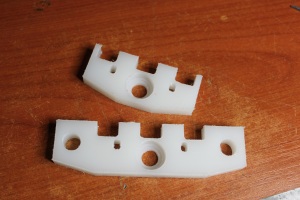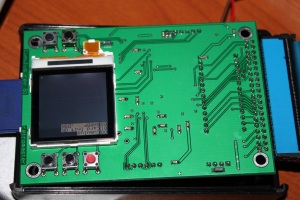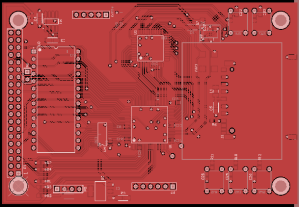Here is today’s second post: Another update on Cumulus.
First, the bad news: It looks like with the most recent change to CumuluBus, Cumulus bus errors were greatly reduced, but not completely eliminated. This is the case with the long cable setup.
Now the good news: I have tried the short cable setup (using the two closely-located connectors on the IDE cable), and during extensive testing, I have not encountered any bus-related issues.
What does this mean? It means that on some Orics the long cable setup may not work properly. In these cases, Cumulus will most probably still work fine in the short cable setup, though. It will be a somewhat inconvenient, though, as the cable length is not more than 10cms.
Why does this happen? Here is my guess:
The CPLD used in the Cumulus (XC95XL series) is a relatively modern part (at least compared to the Oric, that is). It has pin signal rise times in the range of a few nanoseconds.
In the current Cumulus design, the CPLD is connected to the data bus over a level-shifter IC (also w/ fast rise times) and directly connected to most of the bus control signals. The connection is by means of the 80-wire IDE cable. When the length of this cable exceeds a certain threshold, the cable starts to exhibit “transmission line” effects. Without the necessary termination on both ends of the cable, these effects cause significant signal integrity issues.
Even with the “SLOW” rise time setting on the output drivers, the XC95XL is fast enough to limit the length of the cable to just about 10cms.
I have to admit that I have overlooked this aspect of the design. I thought that since the frequencies on the Oric bus are so low, there would not be problems over a long cable. However, I failed to see that it is the rise time that’s the real governing parameter here, which was a mistake. This is most likely why things go wrong with the long cable setup.
One way of solving this problem could be by adding “slow” (74hc or 4000-series CMOS) buffers on the Cumulus side. Since these parts have much higher rise times, the permitted cable could be much longer. An additional advantage is that this way, possibly, CumuluBus could be eliminated! However, it would take a significant redesign effort, and it would enlarge the main PCB by quite a bit. To tell the truth, I am not really motivated to go through another design cycle, especially considering that Cumulus seems to work fine with the short cable setup.








